By Sameh Abboushi
Curated by Khaled Hourani
Zawyeh Gallery
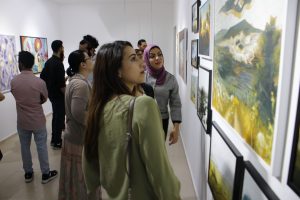
The exhibition that took place in Zawyeh Gallery on August 5, had a special meaning. Sixteen young artists had finally succeeded, some for the first time, in exhibiting their artworks at an established art gallery, hoping to sell their art. The exhibition was the culmination of a journey that started 15 months ago.
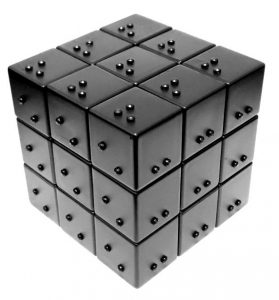
Most of the artists who participated in the exhibition had studied art at the Visual Arts Forum (VAF), previously known as Young Artists Forum, when they were children. They went on to complete their education in universities here and abroad. Some chose architecture and design, others chose visual arts, graphic design, or filmmaking.
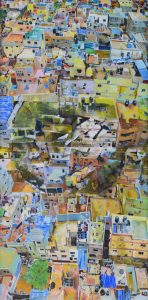
When we revisited them 15 months ago for breakfast under a Palestinian fig tree, we shared memories and listened to their hopes and dreams. They expressed their frustration and felt discouraged by the fact that established art galleries declined to exhibit the artworks they produced. We at VAF made a promise and painted a window of hope. Our sponsors, Dr. Abdulmalek Jaaber and his wife Ms. Rania Ghosheh, opened that window.
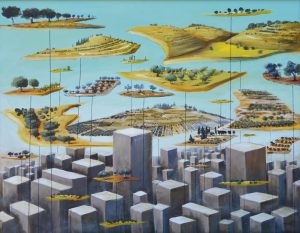
Six months ago, curator artist Khaled Hourani started discussions and deliberations with the artists to create a theme to reflect the realities, hopes, and dreams of this generation – a homeland divided by barriers and walls, no peace or security on the horizon, a region torn apart by civil wars, and the hope for a better future, which felt like the impossible. All these pressing questions were summarized by a verse from a poem by Palestinian poet Mahmoud Darwish, “Take our hands… O, Impossible.”
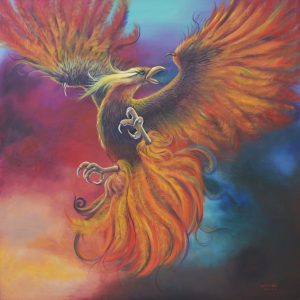
As one walks into the gallery, the first painting that meets the eye is a modern icon painting of Eve, with a red apple in one hand and a golden halo around her head. To the right is Hayati…My Life, summarized by the artist Monther Qaryuti’s open wallet with photos, credit cards, ATM cards, an ID card, and a few banknotes. While Haneen Rayan expresses a colorful Prayer for a better life.
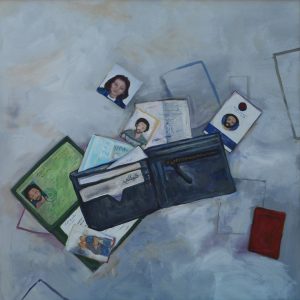
The fourteen paintings of Taqi Sabateen, Bring It Back, is a documentation of a landscape that is being fragmented by extensive settlements, which makes Lara Salous reflect in one of her posters a verse from a well-known national song Mawtinee, “Will I ever see you, my homeland?” Further on, we meet Alaa Albaba in front of his paintings, a bird’s eye view of Al-Amari Refugee Camp where he lives. “I wanted to color the refugee camp with bright colors, critically, to draw attention to the un-colorful, densely populated camp.” Maryam Nowarah’s Cocoon brings hope of the colorful butterfly that will emerge. The impossible Rubik’s Cube for No Sight is made possible by artist Jasem Shuman. Nadia and Zoha express women in waiting, while the eyes of women in Haya Kaabneh’s paintings declare that “Nothing Is Impossible under the Sun.”
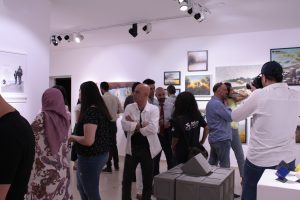
The ultimate answer to our call upon The Impossible is in Du’aa Hussary’s powerful painting, The Rise of the Phoenix.
Sameh Abboushi is chairperson of the Visual Arts Forum.
Artwork photos by Ziad Anani
This Exhibition is supported by the A.M Qattan Foundation through the ‘Visual Arts: A Flourishing Field’ project.
Some works are commissioned and shown for the first time at this exhibition. Works are supported by Mophradat, Culture Resource, and Edhea School of Arts.

